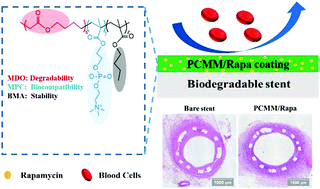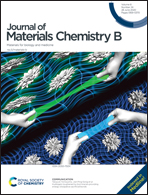Biodegradable phosphorylcholine copolymer for cardiovascular stent coating†
Abstract
Phosphorylcholine (PC) based polymer coatings with excellent biocompatibility have shown successful commercialization in drug-eluting stents. However, poor degradability represents a challenge in the application of biodegradable stents. Herein, a biodegradable phosphorylcholine copolymer is developed based on one-step radical ring-opening polymerization (RROP). This copolymer was synthesized by copolymerization of a PC unit, degradable ester (2-methylene-1,3-dioxepane, MDO) unit and non-degradable butyl methacrylate (BMA) unit, which showed ratio controllability by changing the monomer ratio during polymerization. We demonstrated that the copolymer with the ratio of 34% MDO, 19% MPC and 47% BMA could form a stable coating by ultrasonic spray, and showed good blood compatibility, anti-adhesion properties, biodegradability, and rapamycin eluting capacity. In vivo study revealed its promising application as a biodegradable stent coating. This work provides a facile path to add biodegradability into PC based polymers for further bio-applications.



 Please wait while we load your content...
Please wait while we load your content...